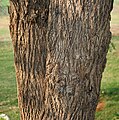Cordia dichotoma
| Cordia dichotoma | |
|---|---|

| |
| Leaves in Hyderabad, India | |
| Scientific classification | |
| Kingdom: | Plantae |
| Clade: | Tracheophytes |
| Clade: | Angiosperms |
| Clade: | Eudicots |
| Clade: | Asterids |
| Order: | Boraginales |
| Family: | Boraginaceae |
| Genus: | Cordia |
| Species: | C. dichotoma |
| Binomial name | |
| Cordia dichotoma | |
| Synonyms[3] | |
List
| |
Cordia dichotoma is a species of flowering tree in the borage family, Boraginaceae, that is native to the Indomalayan realm, northern Australia, and western Melanesia.[2]
Common names in English include fragrant manjack,[4] clammy cherry, glue berry tree and Indian cherry.[2]
Description
Cordia dichotoma is a small to moderate-sized deciduous tree with a short bole and spreading crown. The stem bark is greyish brown, smooth or longitudinally wrinkled. Flowers are short-stalked, bisexual, white in colour which open only at night. The fruit is a yellow or pinkish-yellow shining globose which turns black on ripening and the pulp gets viscid.
Habitat and range
Cordia dichotoma is native to China (Fujian, Guangdong Guangxi, Guizhou, southeast Tibet, and Yunnan) the Ryukyu Islands of Japan, Taiwan, India (including East and West Himalayas,[3]), Pakistan, Sri Lanka, Cambodia, Laos, Burma, Philippines, Thailand, Vietnam, Indonesia, Malaysia, Papua New Guinea, Australia (Northern Territory and Queensland),[2] New Caledonia and Vanuatu.[1] It is a tree of tropical and subtropical regions. It is found in a variety of forests ranging from the dry deciduous forests of Rajasthan to the moist deciduous forests of Western Ghats and tidal forests in Myanmar.
It has been introduced into; Cuba, Florida, Guatemala, Leeward Islands, Marianas, Mexico, Puerto Rico, Tobago, Trinidad and the Windward Islands.[3]
Ecology
The larvae of the butterfly Arhopala micale feed on leaves of C. dichotoma.
Uses

The immature fruits are pickled (see South Asian pickles) and are also used as a vegetable fodder. The leaves also yield good fodder. The fruits of C. dichotoma are edible.[5]
'Joshanda' is a Unani herbal medicine, known for its ability to manage colds, coughs, sore throats, nasal congestion, respiratory problems, and fevers.[6] It consists of seeds of 'Khatmi' (Althaea officinalis), fruits of 'Sapistan' (Cordia dichotoma), dried rhizomes of 'mulethi '(Glycyrrhiza glabra), seeds of 'Khubbazi' (Malva rotundifolia), leaves of 'Gaozaban' (Onosma bracteatum), flowers of Banafsha (Viola odorata) and the dried fruits of 'Unnab' (Ziziphus jujuba).[7] Its fruits of C. dichotoma are a rich source of polysaccharides and are potential sources of phytochemicals with antibacterial and antioxidant activities.[6]
Symbolism
It is the symbol of Phra Nakhon Si Ayutthaya Province in Thailand.
Gallery
- Trunk
- Flowers
- Foliage
References
- ^ a b Botanic Gardens Conservation International (BGCI) & IUCN SSC Global Tree Specialist Group (2021). "Cordia dichotoma". IUCN Red List of Threatened Species. 2021: e.T61986401A207735485. Retrieved 26 December 2023.
- ^ a b c d "Cordia dichotoma". Germplasm Resources Information Network. Agricultural Research Service, United States Department of Agriculture. Retrieved 2011-04-18.
- ^ a b c "Cordia dichotoma G.Forst. | Plants of the World Online | Kew Science". Plants of the World Online. Retrieved 18 October 2023.
- ^ "Cordia dichotoma". Encyclopedia of Life. National Museum of Natural History. Retrieved 9 May 2024.
- ^ Bachheti, Archana; Deepti; Bachheti, Rakesh Kumar; Singh, Anjita; Zebeaman, Meseret; Hunde, Yilma; Husen, Azamal (2023). "Bioactive constituents and health promoting compounds of underutilized fruits of the northern Himalayas of India: a review". Food Production, Processing and Nutrition. 5 (24). doi:10.1186/s43014-023-00140-5.
- ^ a b Rahayu, E.S.; Martin, P.; Dewi, N.K.; Kurniawan, F.H. (2017). "Cordia dichotoma G. Forst.: Bioecology and population density". Journal of Physics: Conference Series. 824 (1): 012059. Bibcode:2017JPhCS.824a2059R. doi:10.1088/1742-6596/824/1/012059. 012059.
- ^ "Top 10 Best Health Benefits and Uses of Joshanda". Gyanunlimited. 8 May 2017. Retrieved 18 October 2023.




